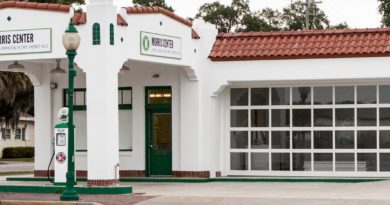There Are Promises Held In Darkened Theaters
story by mary ellen thompson photography by susan deloach
t’s why we go see a film, isn’t it? To be transported to another place, time, mindset? The way particular films affect us stirs up our myriad of emotions and reactions: we smile, we laugh, we cry, we gasp, we nod in agreement or understanding; we may clench our fists, or reach for our friend’s hand, or a tissue. If we don’t do any of those things, the film maker has failed us. There are promises held in darkened theaters, the unexpected about to roll out before us, and what we are left with is not only our imagination, but also the film maker’s ability to draw us into his vision.
But how much of that do we consciously consider? We get our ticket, some popcorn, a drink, choose a seat in preparation for being entertained, enlightened, educated, or maybe even frightened out of our shoes. “Bring it on” we invite those who have created this film we are about to see, then we judge how we liked it. We are all film critics at the end of a movie, but do you know what is interesting about that? Very few of us have any real idea of what goes into making a film so VW Scheich, and his wife, Uyen Le, are going to give you a picture of the picture making business.
Uyen’s background is in corporate and entertainment law, structuring film finance deals, and seeing the process from the business perspective. She is also a writer and producer. VW’s talents lie in writing, directing, production and post-production work.
How do they choose where to start when making a film?
UL: There are so many stories one could tell, it’s important to recognize what you have to work with.
VW: Part of the experience is knowing how not to bite off more than you can chew and how to work with your assets. But it comes down to telling a story you’re passionate about, one you can’t live without doing. And then it takes undaunted perseverance for years.
Although they have several collaborations between them, their film Interwoven will make its South Carolina, and East Coast, premiere at the Beaufort International Film Festival (BIFF) this year. Interwoven combines real moments in the life stories of thirteen people and weaves them into a single narrative. Two main characters’ lives intersect in a way that each impacts the other, and the idea we come away with is that we never know how our story will affect someone else. The film promises to captivate the audience with a combination of emotional forces. But let’s start at the beginning.
VW: We were sitting around in Los Angeles wanting to make a movie, but we had limited funds. So we took a creative approach and developed the film backwards, letting the characters drive the story. We placed a casting call and received 2011 submissions. None of those people knew what the movie was about, and neither did we, yet. Normally an actor reads a script, and gets a character breakdown, but there was no script. Instead we were looking for a true compelling story, or moment, from the actor, and that was where we would start. I met 75 of the actors who responded. I spent about an hour and a half with each of them. It was quite an intense process. I asked them to tell me about a moment that shaped their life.
UL: The idea was that you never know who will play a role in your life. For example, VW and I met years ago as strangers sitting next to each other on an airplane flying to Los Angeles.
VW: The next morning I would tell Uyen about the interviews/auditions. Some stories were way too big, i.e. “I spent a year in Tibet and it changed my life…” Then we found a story we could shoot. A young woman told me that she was getting ready to go out when she got a phone call from her father telling her he had cancer. Her life was never the same after that call. Over the course of the next two weeks, we found more life-changing stories which we scripted into one cohesive narrative.
Now that the concept was settled on, the budget was the next consideration. “How much money do we need? How much money would we like?” Uyen explains that the budget is divided into three categories: above the line, below the line, and post-production costs. Above the line includes: the stars, director, writer, producer. Below the line: crew, equipment, food, transportation, fuel, travel, locations, permits, legal fees, insurance. Post production costs are things like the editor, colorist, composer/score; then tack on about ten percent of the total budget for contingencies.
In Interwoven, the majority of actors are telling their own stories so they’re invested in the project and the process. One actress offered her house as a location for shooting her scene and others. “On a tight Indie film budget, the fewer locations there are, the better it is,” Uyen explains, “because every time you move, you lose not only time, but daylight, and it costs money, so the longer you stay in one location, the better.”
VW says, “Then it’s time to raise the funds. In our case, we reached out to family, friends and a couple of investors to realize the funding. It’s all complicated, so you really have to love it. I’m a big picture guy so I naturally shoot for the moon for every project.” Uyen counters, “It’s my job to figure out a plan to shoot said moon here on earth.”
Back to Interwoven: “Another actress auditioned for the movie and told the story about how she caught her husband cheating on her. She was so hurt that she wanted him to die, so she started putting rat poison in his food. After being confronted by a physician about her actions, she left her husband and moved to New York. We felt she should not have to re-live that painful and difficult story so we re-cast her role for the film with an Academy Award winning actress.”
The film was shot in three weeks. Next, it was moved into post-production for editing, sound design, scoring and visual effects. Finally the film was ready to submit to festivals.
Since what we’ve seen so far is money going out, like the low spring tide, how does it come back in and repay the investors? Well, it helps if the film wins awards in the festivals, every laurel that can be applied to a film gives it a boost. Once a film has been entered in all the desired festivals, in the case of Interwoven, the world premiere was in October 2015 at the Mill Valley Film Festival, and after BIFF in 2016 the film will screen at Durango Independent Film Festival, Richmond International Film Festival, and Garden State Film Festival. Then a distribution plan will be launched and the film will be for sale on line. Once that happens, the investors can be repaid.
Having met Ron and Rebecca Tucker at the Charleston International Film Festival in 2012, where their film Wallenda won two awards for best film, Uyen and VW brought the film to BIFF in 2013, where it also won the award for Best Short Film. Wallenda is a mesmerizing twenty minute film about the high wire performer Karl Wallenda, and how he got his start in the 1920s. VW’s own family included several circus performers; his parents had a motorcycle act with the Clyde Beatty Cole Bros. Circus in the 1970s and 80s; his paternal grandmother and her family were high wire artists in Europe; and Karl Wallenda died while performing in San Juan, Puerto Rico on the day that VW was born.
In 2014, VW and Uyen returned to BIFF with Pawn, which won the award for best screenplay. (Coincidentally, when they were here for that festival, they actually started writing their notes for Interwoven on the porch at The Rhett House.)
In 2015 the couple moved to Beaufort to make the movie Basement Bob, which is a comedy written by Gary Weeks, (another favorite son at BIFF), and will be co-directed by VW and Gary. It promises to be outstandingly hilarious. “Bob still lives in his ex-wife’s basement but when she decides to sell the house, Bob will go to every ridiculous extreme to keep from losing her forever.” Since we don’t have a plethora of basements in Beaufort, there is bound to be some of VW’s legendary creativity in finding locations.
A perfectly matched pair, Uyen and VW have enough enthusiasm and energy to light up the city, and when they turn, they turn their smiles toward you, you just want to sign on for whatever they’re up to next. So be sure you don’t miss the screening of Interwoven at 4:15 on Thursday, February 11, 2016 at USCB Center for the Arts where BIFF is being held. And keep your eyes and ears open for updates on Basement Bob.




